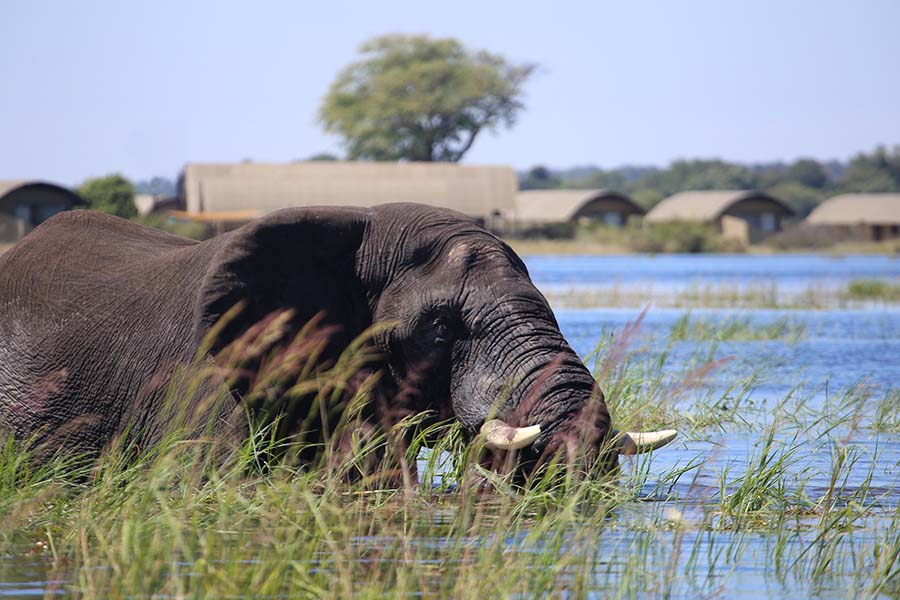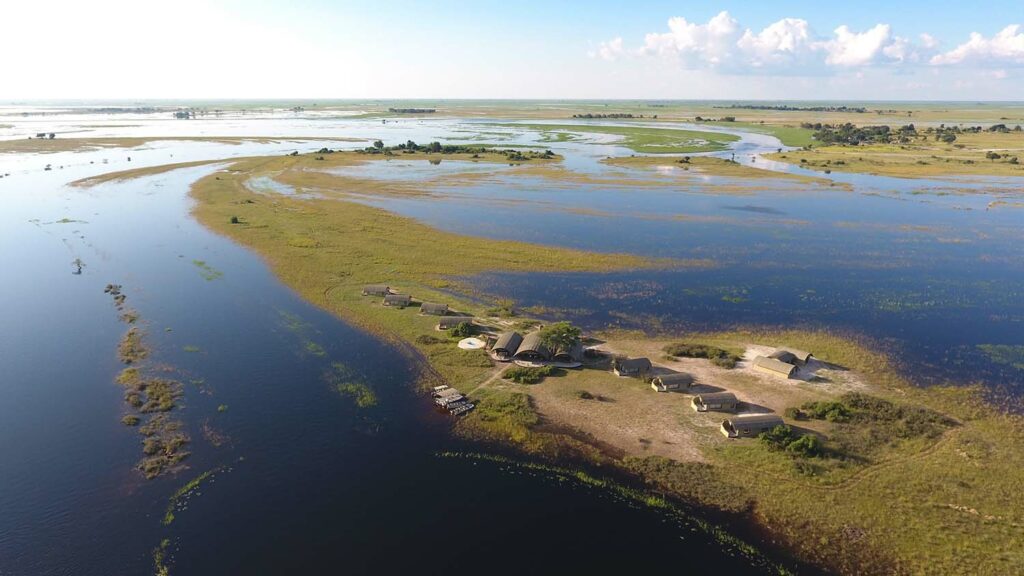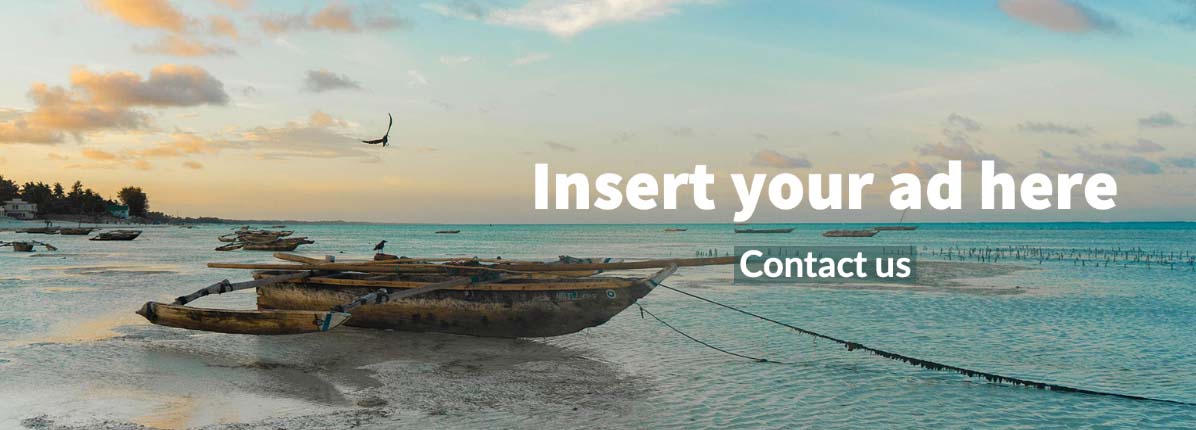The boat is picking up speed as we set sail for our destination: Serondela Lodge on the banks of the Chobe River. You can only get there by boat, as at this time of year, the road is flooded. As such, the lodge is located on a seasonal island. Our arrival is spectacular. On our way to the lodge, we see a bathing elephant feeding on the water lilies. A swarm of whistling ducks skims over the water. An innumerable group of baboons makes their way to a drinking area, as does a large herd of antelopes. And then, in the middle of the wilderness and after more than an hour of cruising, we arrive at our destination: Serondela Lodge.
Article continues below.

Serondela Lodge
We stay there for two nights and see only one boat pass by. At Serondela, the wilderness is all yours to enjoy. You fall asleep to the sound of frogs and crickets and wake up to the deep growling of hippos. At Serondela, you don’t really need to go on safari, as the animals simply approach you. The lodge is situated along an elephant corridor. “They’re currently on the other side of the river”, says Simone, the owner. “But from the end of April, they’ll cross over to this side again.”
While we marvel at hundreds of impalas and three elephants on the banks of the Chobe River, a number of hippos plunge into the water at the back of the lodge. And we imagine this is only the wet season – at low tide in July and August, the scenes and animal sightings are even more spectacular. Hunting lions, a rare sight, have been spotted several times on the banks of the river. Serondela works closely with WWF and the Integrated Rural Development and Nature Conservation (IRDNC), collecting scientific data. Simone shows us some reports. “Look”, he says. “We note down every lion we see, as well as the numbers and the location.” His finger hovers over the map of the region. “All sightings are in D17. That’s here, at the lodge.”
Article continues below.

Holidays with impact
The lodge aims to minimise its ecological impact as much as possible. The water is purified and cleared of bacteria before it flows back into the Chobe, the waste is taken back to Katima Mulilo, and the lodge itself is built of sandbags. “It works perfectly for insulation, and it’s a nice way of reducing the use of metal. And we derive the sand from the river”, Simone says.
In the Zambezi region, formerly known as the Caprivi strip, you cannot buy land. The government is the official owner, but the indigenous elders divide the land. When Simone founded Serondela Lodge, he signed a contract with the Kabulabula Conservancy with the approval of the Traditional Authority (elders) and the Ministry of Environment and Tourism. That contract guarantees the rights of the communities and the owners of the lodge, as well as a positive sociological and economic impact of the organisation. For example, 80% of the staff comes from the neighbouring villages, and a visit to the village is included for guests of the lodge. “You are our guest, but we are their guest”, Simone explains. “This is their land.”
A hospitable welcome in Ijambwe
On behalf of his family, Josef welcomes us to Ijambwe. The community consists of one family of 55 adults and 35 children. “We’re fishermen”, he says. “In the evening, I prepare our nets, so that we can go out in the early morning. Then we sell the catch at the market in Kasane.” He shows us how to build a mud hut and teaches us about local customs and the medicinal uses of plants. The Kigelia Africana, the so-called sausage tree, appears to serve several purposes: you can boil the fruit as an antibiotic against toothache, but also use it to enhance male sexual functions. A fig tree helps with eye infections.
Josef points to a solar panel. “Previously, the women and children fetched the water from the river. But the river is full of crocodiles, and accidents happen regularly. To protect our women and children, we now pump the water using solar power. Until recently, we used a generator, but petrol became too expensive, so now we’ve changed the system.”
Review Serondela Lodge
Location: incredible. The lodge is located at an elephant crossing and is visited daily by all kinds of wild animals. From the pool, you can watch elephants taking a dip on the other side of the river.
Service & facilities: excellent.
Rooms: the rooms are stylish and comfortable with beautiful views of the surrounding area.
Disabled accessibility: no.
Note: Serondela only has eight rooms available, which makes the stay a very intimate and personal experience. The lodge is sustainable and contributes positively to the local economy. The stay at Serondela Lodge is one of the absolute highlights during our tour of Namibia.
You can stay at Serondela from €200 per night. You can book directly through the website of the accommodation. You can also book the overnight stay as part of your tour through Namibia with About Africa Safaris. Serondela can be accessed by boat from the Namibian side (Nakabolelwa) in flood times, or the Bostwana side (Kasane) all year round. Our stay was made possible by the Namibia Tourism Board and About Africa Safaris.


Recent Comments